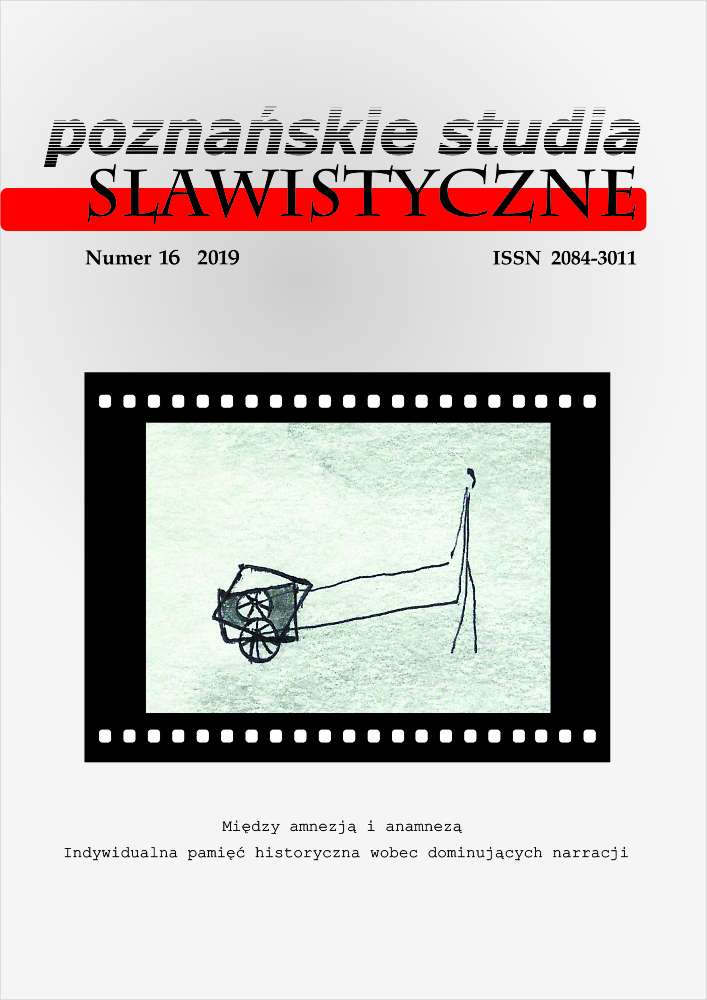Abstract
The article considers the experience of inheriting the traumatic memory in prose of Magdalena Tulli and autopsychotherapeutic functions of it’s narrativization with the help of elements of psychotherapeutic methods (family constellations, a dialogue with a child in yourself, deconstruction and reconstruction of the life narratives, re-membering, therapeutic metaphor, focusing). The narrativization of the trauma in the process of artistic narration contributes processing traumatic experience, is an important element of constructing of autobiography, gives a chance to retrieve own history, which is not overshadowed with tragic parental discourse, helps to achieve balance between traumatic and positive contents of autobiographical memory, fulfills interpsychological functions.References
Cuber, M. (2013). Metonimie Zagłady w polskiej prozie lat 1987–2012. Katowice: Uniwersytet Śląski.
Cyrulnik, B. (2014). Ratuj się, życie wzywa. Przeł. E. Kaniowska. Kraków: Czarna owca.
Fresco, N. (1984). Remembering the Unknown. “International Review of Psycho-Analysis” nr 11, s.17–27.
https://doi.org/10.3917/lgh.011.0007
Gilmore, L. (2015) Przypadki graniczne: trauma, autoprezentacja i prawne formy tożsamości. W: Antologia studiów nad traumą. Przeł. K. Bojarska, T. Bilczewski i in. Kraków: Universitas.
Hirsch, M. (2010). Żałoba i postpamięć. W: Teoria wiedzy o przeszłości na tle współczesnej humanistyki. Antologia. Przeł. K. Bojarska, s. 245–278. Poznań: Wydawnictwo Poznańskie.
Hirsch, J. (2015). Postmodernizm, drugie pokolenie i międzykulturowe kino posttraumatyczne. W: Antologia studiów nad traumą. Przeł. K. Bojarska, T. Bilczewski i in. Kraków: Universitas.
LaCapra, D. (2015). Trauma, nieobecność, utrata. W: Antologia studiów nad traumą. Przeł. K. Bojarska, T. Bilczewski i in. Kraków: Universitas.
LaCapra, D. (2009). Pisanie historii, pisanie traumy. W: Pamięć Shoah. Kulturowe reprezentacje i praktyki upamiętnienia. Red. T. Majewski, A. Zeidler-Janiszewska, M. Wójcik. Łódź: Wydawnictwo Officyna.
Langer, L. (2004). Scena pamięci. Rodzice i dzieci w tekstach i świadectwach Holokaustu. Przeł. J. Mikos. „Literatura na Świecie” nr 1–2.
Przymuszała, B. (2008). Skaza? – Holocaust jako problem polskiej pamięci. Szukanie opowieści. W: Narracje o Polsce. Red. B. Korzeniewski. Poznań: Wydawnictwo Poznańskiego Towarzystwa Przyjaciół Nauk.
Przymuszała, B. (2016). Smugi Zagłady. Emocjonalne i konwencjonalne aspekty tekstów ofiar i ich dzieci. Poznań: Uniwersytet im. Adama Mickiewicza w Poznaniu.
Sieniewicz, M. (2014). Walizki hipohondryka. Kraków: Znak.
Sobolewski, T. (2012). Magdalena Tulli: nie ma zmyślonych opowieści. „Gazeta Wyborcza”, 15 września.
http://wyborcza.pl/1,75475,12487543,Nike_2012__Magdalena_Tulli__Nie_ma_zmyslonych_opowiesci.html 24.04.2018.
Szwajca, K. (2011). Rodziny po Zagładzie. „Midrasz” nr 6, s.10–19.
Tulli, M. (1998). W czerwieni. Warszawa: W.A.B.
Tulli, M. (2006a). Tryby. Warszawa: W.A.B.
Tulli, M. (2006b). Skaza. Warszawa: W.A.B.
Tulli, M. (2011). Włoskie szpilki. Warszawa: Nisza.
Tulli, M. (2014). Szum. Kraków: Znak literanova.
Tulli, M. (2017). Jaka piękna iluzja. Kraków: Znak literanova.
Wywiad (1999). Calvino, Marquez i pewna pani. Rozmowa z Magdaleną Tulli. W: Czapliński, P., Śliwiński. P. Kontrapunkt. Rozmowy o książkach. Poznań: Obserwator.
Wywiad (2011). Ludzik mi padł, więc gram następnym. „Gazeta Wyborcza”, 30 października. http://wyborcza.pl/duzyformat/1,127291,10548289,Magdalena_Tulli__Ludzik_mi_padl__wiec_gram_nastepnym.html?pelna=tak. 24.04.2018
Wywiad (2014a). Prywatne klocki – wywiad z Magdaleną Tulli. „Centrala”, 31 listopada. http://czytamcentralnie.blogspot.ru/2014/10/prywatne-klocki-wywiad-z-magdalena-tulli.html. 24.04.2018
Wywiad (2014b). Zbuntowana – rozmowa z Magdaleną Tulli. „Gazeta Wyborcza”, 26 września. http://wyborcza.pl/1,75410,16711994,Zbuntowana___rozmowa_z_Magdalena_Tulli.html. 24.04.2018
Adel’gejm I.E. (2018). Psihologiâ poètiki. Autopsihoterapevtičeskie funkcii hudožestvennogo teksta (na materiale pol’skoj prozy 1990–2010-h gg.). Moskva: Indrik.
Veselago, E.V. (2010, 2011). Sistemnye rasstanovki po Bertu Hellingeru: istoriâ, filosofiâ, tehnologiâ. „Psihoterapiâ” nr 7, nr 1. http://www.constellations.ru/paper.html. 24.04.2018.
Gordon, D. (1995). Terapevtičeskie metafory. Okazanie pomoŝi drugim posredstvom zerkala. Sankt-Peterburg: Belyj krolik.
Džendlin, Û. (2000). Fokusirovanie. Novyj psihoterapevtičeskij metod raboty s pereživaniâmi. Per. A.S. Rigina. Moskva: Nezavisimaâ firma «Klass».
Mills, D., Krouli, R. (2000). Terapevtičeskie metafory dlâ detej i vnutrennego rebenka. Per. T.K. Kruglovoj. Moskva: Nezavisimaâ firma «Klass».
Nurkova V. (2000). Sveršennoe prodolžaetsâ: psihologiâ avtobiografičeskoj pamâti ličnosti. Moskva: URAO.
Roždestvenskaâ, E.Û. (2012). Biografičeskij metod v sociologii. Moskva: Izdatel’skij dom Vysšej školy Èkonomiki.
Ruppert, F. (2015). Simbioz i avtonomnost’. Rasstanovka pri travme. Simbiotičeskaâ travma i lûbov’ po tu storonu semejnyh perepletenij. Per. A. Sokolovoj. Moskva: Institut konsul’tirovaniâ i sistemnyh rešenij.
Uajt, M. (2010). Karty narrativnoj praktiki. Vvedenie v narrativnuû terapiû. per. D.A. Kutuzova. Moskva: Genezis.
Ševcova, I.V. (2008). Trening raboty s sobstvennym detstvom. Sankt-Peterburg: Reč’.
License

This work is licensed under a Creative Commons Attribution-NoDerivatives 4.0 International License.

